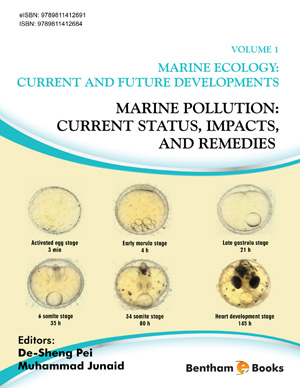Abstract
Aim of this study focused on monitoring the environmental indicators and bacterial pathogens level based on the aquaculture practices that impacted on the Muthupettai mangrove ecosystem. Water samples were collected at five stations during the pre-monsoon season, and samples were analyzed by standard methods. The results of environmental parameters were shown as follows: temperature (31.4-33.2 °C), pH (7.9-8.6), EC (12-14 mS/cm), TSS (4650-5500 mg/l), TDS (36400-41650 mg/l), TS (41250-46450 mg/l) and DO (2.2-4.1 mg/l); total heterotrophic bacteria (72-294 102 cfu/mL), total coliform bacteria (9-150 101 cfu/mL), fecal coliform bacteria (4-135 101 cfu/mL), total Enterococcus bacteria (1-10 101 cfu/mL) and E.coli (2-46 101 cfu/mL); and the Pathogens: total Vibrio species (1-6 101 cfu/mL), total Salmonella species (1-3 101 cfu/mL), total Shigella species (1-2 101 cfu/mL), and total Klebsiella species (1-39 101 cfu/mL). These results were more vulnerable to the ecosystems and highly exceeded the standard permissible limits of the WHO, EU, and CPCB. Continuously discharges of untreated aquaculture effluents deteriorated the mangrove ecosystem qualities. Therefore, there is a need for a regular monitoring and systematic waste management from aquaculture, which can develop sustainable aquaculture and strictly follow the recommended management rules and regulations of aquaculture practices at national or regional level. Further research needs to improve the ecosystems qualities and maintain the rich biological diversity in the Muthupettai mangrove ecosystem.
Keywords: Physico-Chemical, Indicators, Pathogens, Shrimp Culture, Mangrove Ecosystem.






















